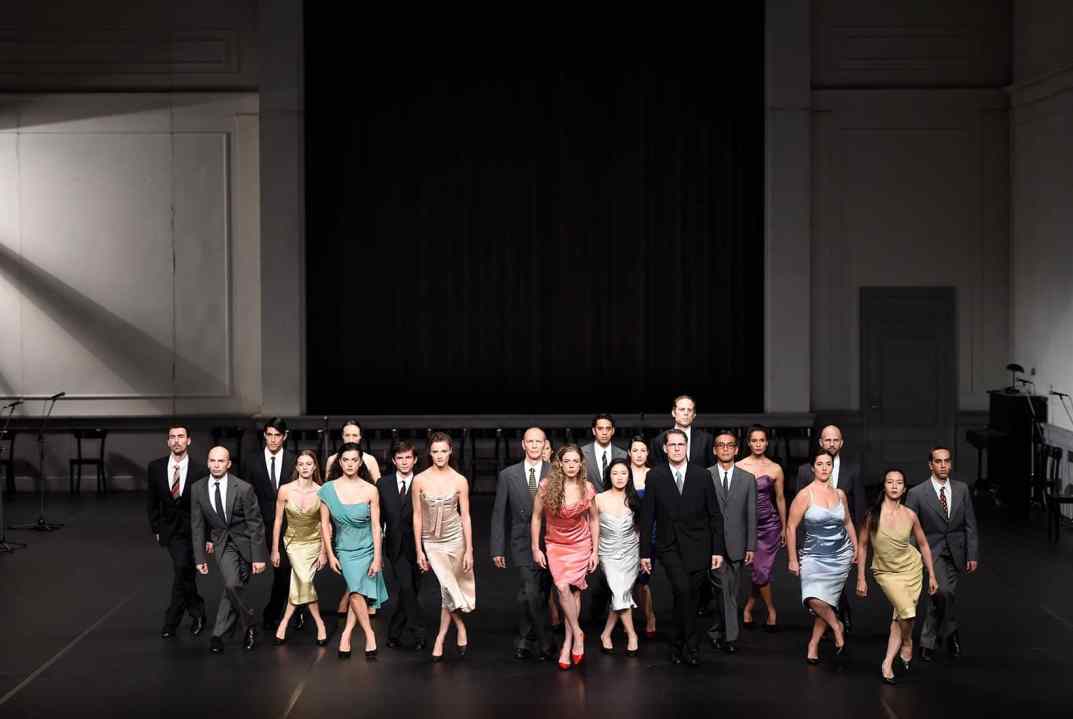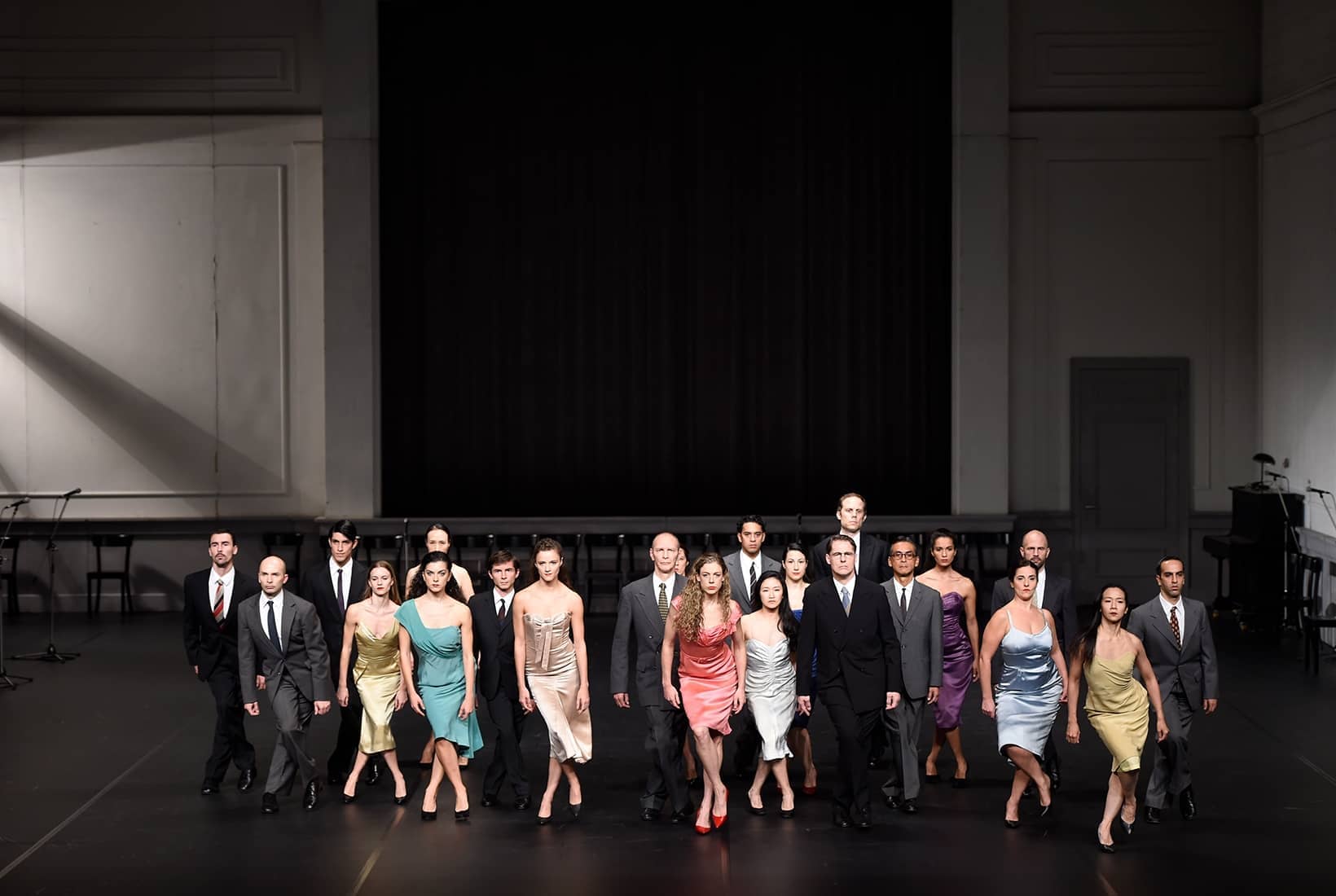When you take in the richness of a Pina Bausch production — the redolent staging, the eloquent, eccentric twists of the choreography — it’s everything and it’s something. Kontakthof, created in 1978, sounds the bell of hopeful passes and freighted expectations, centuries of hearts on the line, desperate to elude solitude. A keystone of her back catalogue, the piece illuminates the convoluted, often rotten thrusts of human desire, with special emphasis on women’s vulnerability in the dating game.
A gramophone pipes out vintage love songs as the ensemble to and fro across a dance hall in Bausch’s standard-issue suits and gowns. The title — a reference to the area of a brothel where johns choose their prostitutes — comes to the fore in the opening scene as the dancers present themselves for inspection one by one. The encounters that ensue reel with double standards. Strut too confidently in your heels and you’re a slut; teeter in them and you’re a wimp. How does a real man act? A real woman? How should they? The choreography swings between violent and comic, intimacies losing their discretion as they’re thrust into the spotlight. At three hours long, the point is made (and made again) that to have and to hold is no simple thing.
Cowboy waddles give way to animal laughter, the body going to strange, unexpected places
Bausch’s genius was bringing a charming streak to even the grimmest subjects. Here, polyglot rambles and poker-faced jazz pyramids light up the show, the group box-stepping with taut precision, adding sultry hip wiggles. Between the yanking and the groping, it’s easy to forget they can dance for real, but they remind us with an electric skate upstage, an exquisite tangle of limbs and hair and palms upturned in exultation.
100% Cuban from Acosta Danza, Carlos Acosta’s platform for young talent in Cuba, brings five recent works to the UK stage, starting with Liberto from Raul Reinoso, a duet about the ruinous endurance of slavery. The piece starts with Mario Sergio Elias stooped in the literal hunch of someone in the stocks, but swiftly develops into a layered performance taking in some rich mystical threads. Zeleidy Crespo’s surprise entrance in green satin is a gorgeous moment of spectacle.
Meanwhile, Pontus Lidberg’s Paysage, soudain, la nuit harnesses the company’s flair for bouncy contemporary dance, weaving together a Technicolor dreamscape of breezy chugs and joyful prances. Yasser Dominguez’s energy leaps off the stage here and in Norge Cedeno and Thais Suarez’s Hybrid, although it’s not enough to save the latter, which sports vague themes and uneven choreography, the dancers dressed for a future we’re told nothing about. Crespo returns for a solo by Maria Rovira — this time a vision in blue, bounding from one statuesque shape to another, an ocean in flux — and the bill rounds off with De Punta a Cabo, by Alexis Fernandez and Yaday Ponce, a feel-good finale alive with starbursts of action, including some surprise sprinkles of pointework. It’s the liveliest work of the night, leaning hard into the company’s raw, zippy energy.
NDT2 — the esteemed youth branch of Nederlands Dans Theater — is a poster child for Dutch modern dance, with its athletic, witty blend of ballet and contemporary styles. Its latest bill opens with a world première from Marco Goecke, developed after the death of his father. Elbows hinge and spines stoop, twitchy, gnarled arrangements of self. The phrasing reflects the awkward wanderings of grief, with cowboy waddles giving way to animal laughter, the body going to strange, unexpected places. The piece plays out to an emotive, if sometimes heavy-handed, medley of Tori Amos songs, and is topped and tailed with some splintery male solo work.
Hans van Manen’s Simple Things is a mellow follow-up, a quartet that brings a skittering edge to the balletic duet. The dancing has an underwater quality, the dancers swishing through their motions, sucked into each other’s whirlpools. Emmitt Cawley is especially dynamic, taking the playful moments extra seriously, like a dutiful clown, while Cassandra Martin grabs eyes with her pensive, slanting lines.
The bill’s closing number is its strongest: Impasse by Johan Inger, a madcap morality tale that warns against peer pressure and blind conformity. Three friends cavort outside a house that spits out a parade of fabulous characters, from a rumba brigade to a deranged circus troupe. The music thickens, the cabaret throbs, and the odds of getting swallowed up whole grow tensely, tantalisingly high.







Comments